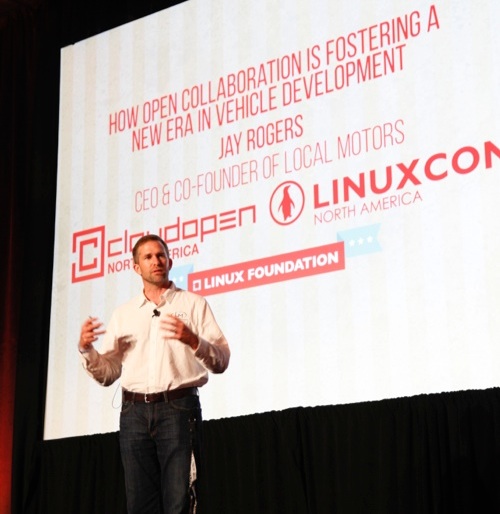 Though Local Motors was the first car company to produce an open source vehicle, Founder Jay Rogers says it is not an open source car company. It’s a hardware company.
Though Local Motors was the first car company to produce an open source vehicle, Founder Jay Rogers says it is not an open source car company. It’s a hardware company.
Traditional car companies have long product cycles, intricate assembly processes, and high production and distribution costs. Local Motors’ approach is instead akin to a software or microelectronics company that’s iterative, fast and lower cost.
“We can develop a hardware system that’s commonly known as a vehicle five times faster and with 100 times less capital put into it,” Rogers said in his keynote Wednesday afternoon at LinuxCon and CloudOpen in Chicago.
To accomplish this, the company is re-imagining every aspect of a car’s design and construction, using Internet-age practices familiar now to the software industry but that are entirely new to the car industry, including crowdsourcing, collaboration, and open source design.
Their cars are designed by individuals – designers, engineers and enthusiasts, and fabricators – who collaborate and iterate on their open source schematics online and in their garages. The cars are then made locally in their “microfactories” in direct response to demand from commercially accessible, hand-welded or 3D-printed parts. And they’re sold online and through a new chain of Local Motors retail stores.
“Our microfactories can’t take on Deerborn or Toyota City in making things but what they do is much more important,” Rogers said. Instead of focusing on large volume production, Local Motors can meet immediate consumer demand, “by bringing down the minimum efficient scale of what can make profit on a build floor,” he said.
Open source design is key to their design-build process, he said, because it allows for transparency into what works and what doesn’t work, which in turn speeds production.
“I’m going to call out Tesla on this, as much as I love them, they didn’t open source the car company. There’s no way that you get inside the Model S,” Rogers said. “And therefore there’s no way for you to learn how to make a car better. That’s what’s important in creation of a vehicle.”
There are several open source initiatives already underway to enable open source software in cars, including the Linux Foundation’s Automotive Grade Linux group. But so far those projects have been mostly focused on the in-vehicle infotainment centers, which provide the user interface for the car and its entertainment system but not to the car’s internal systems. That’s not enough to fully transform the industry, Rogers said.
“You need to know how to hack the hardware in the car, because that’s what defines how you can drive it and how you can run it.”
Beyond the monumental task of attempting to disrupt the automotive industry, Local Motors also faces many of the more mundane challenges familiar in the open source software world. Patent law inhibits sharing, he said. Figuring out how to better enable the community to collaborate on hardware is also a challenge, as is the culture of Silicon Valley which “doesn’t understand hardware,” he said. Despite these obstacles, Local Motors is aiming high.
“We’re going to change the vehicle industry,” he said, “and for the better.”


